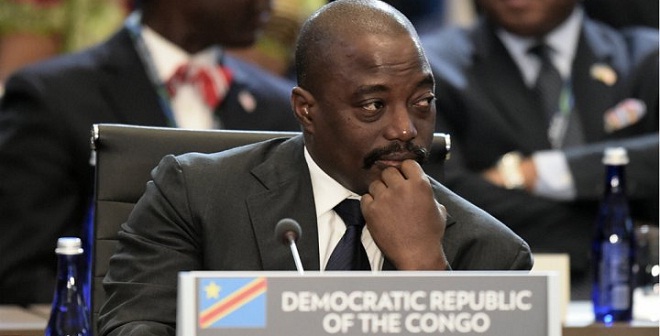
Kinshasa, DR Congo | AFP | Congolese President Joseph Kabila named an expanded new government on Tuesday, with almost all his old team retained, as part of power-sharing deal to end a crisis over his wish to remain in power.
The presidential list of 60 ministers, read out on television, includes almost all members of the outgoing administration, who keep their posts, along with members of the opposition.
The announcement comes a month after Kabila named main opposition leader, Bruno Tshibala, as prime minister of the Democratic Republic of Congo, honouring a pledge made as part of the power-sharing deal agreed in December.
Tshibala is former secretary-general of the opposition Union for Democracy and Social Progress (UPDS) party, which has been at the centre of the political row with Kabila.
Tension has been mounting across the vast mineral-rich nation of 71 million people since December, when Kabila’s second and final term officially ended but elections failed to be held.
On New Year’s Eve, pro-government and opposition groups agreed to a deal brokered by the influential Roman Catholic Church that sought to avert a full-fledged crisis.
It said Kabila, 45, would remain in office until elections in late 2017, ruling in tandem with a transitional watchdog and a new premier chosen from within the ranks of the opposition “Rassemblement” (Unity) coalition.
But the death of coalition leader, veteran UPDS chief Etienne Tshisekedi, held up the deal.
Tshibala has since been excluded from both the UPDS and the Unity coalition.
Four UPDS deputies were named on Tuesday in the new government whose main task is to organise a presidential election before the end of the year.
The new faces in government were made possible by increasing the number of its members to 60 from the 54 in the previous administration.
However, given the social and economic crises in the country, that deadlines now looks little more than hypothetical.
Tshibala succeeds Samy Badibanga, another UPDS leader who was named prime minister only last November.
Kabila has been in power since 2001. The DR Congo was plunged into a political crisis in 2011 when the previous presidential vote was tainted by complaints of massive electoral fraud.
Earlier Tuesday about 100 riot police surrounded the UPDS headquarters in the capital Kinshasa Tuesday, while a party spokesman claimed authorities wanted to stop them building a tomb for their late leader Tshisekedi.
Neither the authorities nor police would comment on the deployment.
The newly announced DRC All-Inclusive Interim government: (Ministers of State are Senior just below D/PMs)
Prime Minister: Bruno Tshibala from the UDPS
Deputy Prime Minister, Minister of Foreign Affairs and Regional Integration: Leonard She Okitundu
Deputy Prime Minister, Minister of the Interior and Security: Ramazani Shadari
Deputy Prime Minister, Minister of Transport and Communication: José Makila
Minister of State, Minister of Justice, Keeper of the Seals: Alexis Ntambwe Mwamba
Minister of State, Minister of Planning: Modeste Bahati
Minister of State, Minister for the Budget: Pierre Kangudia
Minister of State, Minister of Decentralization and Institutional Reforms: Azarias Ruberwa
Minister of State, Minister of Employment and Labor: Lambert Matuku
Minister of State, Minister of Foreign Trade, Jean Lucien Mbussa
Minister of State, Minister of Public Service: Michel Bongongo
Minister of State, Minister of Foreign Trade, Jean Lucien Mbussa
Minister of State, Minister for Relations with Parliament: Jean Pierre Lisanga
Minister of National Defense, Veterans and Reintegration: Crispin ATAMA
Minister of Finance: Henry Yav
Minister of Communication and Media: Lambert Mende
Minister of the Portfolio: Wivine Mumba
Minister for Posts, Telecommunications and New Information and Communication Technologies: EMERY OKUNDJI
Minister of Mines: Martin Kabwelulu
Minister of Land Affairs: Lumeya Du Malegi
Minister for Regional Planning and Renovation of the City: Félix Kabange Numbi
Minister of Infrastructure, Public Works and Reconstruction: Thomas Luhaka
Minister of Planning and Housing: Joseph Kokonyangi
Minister of Hydrocarbons: Aimé Ngoy Mukena
Minister of Energy: Marcel Ilungu Leu
Minister of Energy and Water Resources: Ingele Ifoto
Minister of the Environment and Sustainable Development: Ami Ambatobe
Minister of Tourism: Franck Muedi
Minister of Small and Medium Enterprises: Welcome Liyota
Minister for Development Cooperation: John Kwet
Minister of Agriculture: Georges Kazadi Kabongo
Minister of Epsp: Gaston Musemena
Minister of Gender, Children and Families: Chantal Nsafu
Minister of Social Affairs: Eugène Sérufuli
Minister of National Solidarity and Humanitarian Action: Bernard Biando
Minister of Sports and Recreation: Pay Nyango
Minister of the Esu: Steve Mbikayi
Minister of vocational training, trades and crafts: Pierrot Mweka
Minister for Scientific Research: Eve Muakasa
Minister of Rural Development: Justin Bitakwira
Minister of Human Rights: Ange Mushobekwa
Minister of Health: Oly Ilunga
Minister of Youth and Initiation to New Citizenship: Maguy Kiala
Minister of Fisheries and Livestock: Paluku Kisaka
Minister of Customary Affairs: Guy Mikulu
Minister of Culture and Arts: Astrid Madiya
Minister for Congolese Abroad: Emmanuel IMALONGO
Minister delegated to the Prime Minister: Tshibangu Kalala
Deputy Minister for Foreign Affairs: Elder Matembo
Deputy Minister for International Cooperation: Freddy Kita
Deputy Minister of Internal Affairs and Security: Basile Olongo
Deputy Minister of Budget: Maguy Rwakabuna
Deputy Minister of Finance: Jean François Mukona
Deputy Minister of Posts: Omer Egwake
ITPR Deputy Minister: Papy Matenzolo
Deputy Minister of Labor: Atis Kabongo
Deputy Minister of Agriculture; Noel Botakile
Deputy Minister for Urban Planning: Willy Mbolia
Deputy Minister of Planning: Jean Pierre Nzepele.
 The Independent Uganda: You get the Truth we Pay the Price
The Independent Uganda: You get the Truth we Pay the Price






Hi, of course this pawragraph is truly nice and I have learned lot of things from it on the topic of blogging.
thanks.